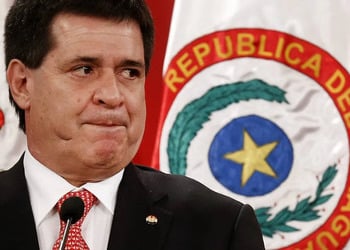A new report from Paraguay’s Congress is the latest to connect former President Horacio Cartes to crimes ranging from cigarette smuggling to money laundering, although it remains unclear if this will lead to immediate legal consequences for him.
Cartes is described as the “architect of the illicit trafficking of tobacco products in the region,” as well as being allegedly connected to money laundering, drug trafficking, weapons trafficking, tax evasion, and bribery, in a report presented to Congress on October 18 by a legislative commission tasked with investigating money laundering.
It is the latest in a series of moves taken against Cartes this year. In July, the US State Department accused Cartes of participating in “significant corruption”. The former president allegedly obstructed a criminal investigation and also maintained ties to “foreign terrorist organizations,” according to a statement released by US Secretary of State Antony Blinken.
And in February, the current government presented the findings of an investigation containing extensive details on an alleged cigarette smuggling and money laundering network connected to the former president.
Cartes is one of the most influential people in Paraguay. A former president from 2013 to 2018, he is among the wealthiest men in the country through his control of Grupo Cartes, a conglomerate involved in dozens of businesses. He has also been connected to criminal activity for years.
He was briefly jailed for currency fraud in 1989, though the case was eventually dropped, and has since firmly denied any criminal connections. Since the report was published, Cartes’ lawyer, Pedro Ovelar, dismissed it as “political” and containing “no evidence connecting Horacio Cartes to what was presented.”
Cartes retains, however, immense influence in Paraguay. The current Attorney General, Sandra Quiñónez, is facing a congressional investigation into whether she is protecting Cartes by refusing to prosecute him. He remains highly active in politics, especially within the ruling Colorado Party. Apart from being banned from entering the United States, Cartes has faced no immediate legal consequences.
SEE ALSO: No Smoke Without Fire: Inside the Investigation into Paraguay’s Horacio Cartes
InSight Crime breaks down the findings of the commission’s report and looks at the most severe accusations Cartes is facing.
Illegal Tobacco Kingpin
Cartes’ role in the illegal tobacco trade allegedly stems from his ownership of Paraguay’s largest cigarette manufacturer, Tabacalera del Este (Tabesa). Around 97% of cigarettes produced in Paraguay end up abroad, according to Alejandro Ramos, an expert in tobacco taxation. While Brazil appears to be the main destination, figures from across Latin America place Paraguay firmly at the center of a regional distribution network for illegal tobacco.
The congressional commission’s report showed Cartes to be not only in charge of production but also of overseeing the distribution of contraband along well-connected routes. “The most frequent modus operandi of cigarette contraband is to pass the cargo along the Paraná River to the river borders with Brazil and Argentina,” read the report.
By land, it also found cigarettes from Tabesa being moved into Bolivia and Brazil, as well as reports that army personnel guarded contraband cigarette shipments.
This is the crime to which Cartes has been most connected, with investigations linking him to this trade going back to long before he won the presidency.
But the report hinted that the former president could have more extensive criminal ties. It also mentioned that Cartes was linked to an Iranian plane that reportedly landed in Paraguay and was loaded up with Tabesa cargo. The report outlined how Cartes allegedly helped finance deals between Brazil’s largest criminal group, the First Capital Command (Primeiro Comando da Capital – PCC) and the Islamist militant group, Hezbollah. The US sanctions against Cartes also stated that he had “documented involvement” with foreign terrorist organizations, believed to refer to Hezbollah.
Financial Schemes At Home
The report found that two major tobacco companies, Tabesa and Palermo, both owned by Cartes, are said to have a “high probability” of having falsified internal purchase reports to facilitate tobacco contraband.
The investigators quoted previous financial investigations that alleged Tabesa had falsified invoices in order to report a false volume of sales, allegedly to hide the smuggling of cigarettes.
SEE ALSO: Money Launderer Extraordinaire Dario Messer Finally Faces Justice in Brazil
The report listed names of executives from both companies who had bought suspiciously large amounts of real estate, presumably with profits from the contraband trade. It also stated that “all this scheme presumably … led by Horacio Cartes” involved suspicious investments in all manner of industries and included “trusts” which managed the flow of money from the illicit contraband trade and ensured the distribution of the cigarettes.
Furthermore, the investigators found a number of allegedly fraudulent tax returns linked to Tabesa as well to some of its clients, with Cartes’ sister, Sarah, named as the operation’s alleged frontwoman.
And Abroad
A high number of suspicious financial transfers were traced back to Tabesa, with some of these allegedly purporting to be payments for raw materials and machinery for cigarette production. The report flagged transfers worth a total of almost $600 million as worthy of investigation. Over $212 million was sent by Tabesa to various accounts in Brazil, $68 million to Mexico, and over $64 million to the Cayman Islands, a well-known tax haven. Others were made to a wide range of countries, including the Bahamas, Dutch Caribbean islands, Finland, Indonesia, Luxembourg, Poland, and Singapore. The tobacco producer is also connected to transfers worth over $1.8 billion paid to entities in the Democratic People’s Republic of Korea between 2015 and 2017.
The report also provided a deep dive into allegations that Cartes ran a money-laundering network between 2013 and 2018 with Dario Messer, a Brazilian believed to be among the most prolific money launderers in Latin American history. In 2019, Brazil filed an extradition request for Cartes for being allegedly connected to millions in suspicious transfers, including during his time in office as president of Paraguay.

